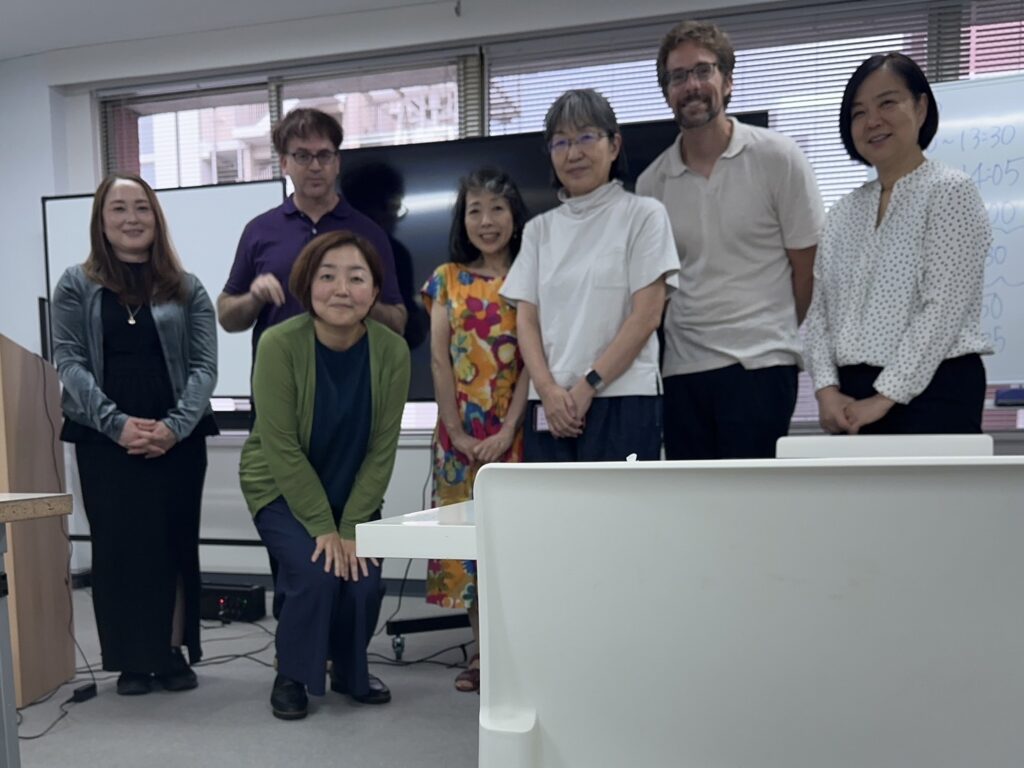新しい参加者がお二人加わり、無事に終了しました。

日時:2024年9月7日(土曜日)、13:00 – 17:00
会場:仙台協立第一ビル 5階(5F)map
宮城県仙台市青葉区国分町1丁目 8-13
Date: Saturday, September 7th, 2024, 1:00 PM – 5:00 PM
Place: Sendai Kyoritsu Daiichi Building 5th floor (5F) map
研究会の後に懇親会を予定しております。(事前予約制)
参加ご希望の方は、こちらの懇親会参加フォーム(Google Form)にて申し込みください。[締切 9月3日(火)23:59]
https://forms.gle/uY6esVGCQpG34ysh9
We are planning a social gathering following the study session on the day of the event (reservation required). If you wish to participate, please register in advance using the following participation form.[Deadline: Tuesday, September 3rd, 23:59].
https://forms.gle/uY6esVGCQpG34ysh9
13:00
開会あいさつ
13:10-13:30
“AI Tools in an EGAP Course: The Write Stuff or Cautious Optimism?”
Barry Kavanagh (Tohoku University)
Abstract: This study investigates the potential of AI-based paraphrasing tools in enhancing first-year students’ EGAP (English for General Academic Purposes) skills at a national university in Japan. Seventy students participated in class units focused on paraphrasing and summarizing techniques. Initially, they were tasked with summarizing and paraphrasing two reading passages and completing a survey regarding the perceived difficulty of the activity. The following week, the students repeated the same summarizing and paraphrasing tasks, this time with the assistance of an AI-based paraphrasing tool, followed by a similar survey that included additional questions about their perceptions of the AI tool. The students’ writing, with and without AI tool support, was evaluated for grammar accuracy, clarity, and readability, using Flesch reading-ease scores assessed by an AI writing assistant. Surveys revealed that students found it challenging to change the word order or structure of the original text when paraphrasing on their own, but this largely disappeared when AI paraphrasing technology was used. The primary difficulty encountered with the AI tool was editing the paraphrased output provided by the software. Although the AI tool improved the grammatical accuracy of the student’s writing, it did not enhance readability; readability scores declined as assessed by the AI writing assistant.
<Q&A 13:30-13:40>
13:45-14:05
「英会話学習に、学習効果の高い学習者と指導者との双方向性(Interaction)を実現するために」
大月敦子(専修大学)
概要:国際化の流れと共に実用英語の必要性がこれまで以上に求められている今日、人々の間では特に英会話力を身につけたいという想いが高まっている。自動翻訳機やAIが普及する一方で、人と人との交流も必要だと考えているからだろう。それを物語るように、ネット上には様々な英会話練習ツールが溢れている。そこで本発表では、ネット上での英会話練習法の現況について触れながら、第二言語習得の立場から”インタラクション仮説(Interaction Hypothesis)” Michael. H. Long(1981・1996)の双方向性の英会話授業実践への適用可能性について論じる。次に、英会話授業における学習者と指導者との双方向性のある授業のありかたと学習効果について、フロアーの方々と発表者と一緒に双方向的に議論を進めたい。
<Q&A 14:05-14:15>
14:20-15:00
「定型表現学習のためのYouTube教材作成ワークショップ」
中村佐知子(東北大学)
概要:英語教育における定型表現学習の意義については、長年にわたり十分論じられてこなかったが、近年、その重要性が指摘されている(金澤, 2020; 中田, 2022)。これに伴い、定型表現学習のための教材の研究開発も必要である。当ワークショップでは、定型表現学習のためのYouTube教材の作成方法を実演解説する。動画教材を使用することで、テキストと音声をひとつのインターフェイスで学習することができる。また、「テキストを読む」「音声を聞く」ためだけの教材ではなく、英文を記憶しリピート練習することで、定型表現を受動語彙としてのみではなく能動語彙として使用できることも目指す教材とした。使用するツールは以下のとおりである。基本的にすべて無料で利用できる。
ChatGPT https://openai.com/chatgpt/
Ryan Spring’s Website https://sites.google.com/view/ryanspring/home
音読さん https://ondoku3.com/en/
Audacity https://www.audacityteam.org/
DaVinci Resolve https://www.blackmagicdesign.com/jp/products/davinciresolve
YouTube https://www.youtube.com/
<Q&A 15:00-15:10>
〈15:10-15:30 Coffee Break〉
15:30-15:50
”Building Future-Ready Skills through Video-Based Learning”
Manami Sato (Kyoto University of Advanced Science)
Abstract: In today’s rapidly changing world, it is crucial for college students to develop flexible thinking and perspectives. The OECD Education 2030 framework highlights three transformative competencies: creating new value, reconciling tensions and dilemmas, and taking responsibility. These principles, influenced by the OECD Tohoku School Project (2012 – 2014), have also shaped the national curriculum for OECD countries. This presentation explores the integration of 21st -century skills through the use of video materials, focusing on critical thinking, problem-solving, and decision-making, into language education. Using Pearson’s Contemporary Topics 1, whose materials feature lecture videos, as the main textbook, the author demonstrates how these competencies can be effectively taught in English classrooms. The presentation will showcase specific classroom activities, including: 1) a gratitude visit (Seligman et al., 2005); 2) win-win negotiations (Covey, 1988); 3) design thinking (Rowe, 1987); and 4) utilitarianism (Mill, 1861). These activities aim to foster a sense of ownership and a sense of responsibility among students and encourage them to take concrete actions as engaged citizens. By incorporating these themes into English education, students not only enhance their language skills, but also develop as proactive members of society, ready to face the challenge of the 21st century.
<Q&A 15:50-16:00>
16:05-16:25
”What should I research? New and hot topics in teaching English through Multimedia”
Ryan Spring (Tohoku University)
Abstract: Many young researchers and new teachers have difficulty finding areas to research or finding new topics to expand into. As technology progresses and using multimedia in TESOL teaching has become increasingly commonplace, some may wonder what sorts of topics there are left to research. However, in looking at the Association of Teaching English through Multimedia (ATEM) and the changes it has undergone many changes in the past decade, including changing the name from “through Movies” to “through Multimedia,” I feel there several new and exciting possibilities in this field that are currently understudied or not examined in enough detail. Drawing on the rich history of ATEM, which conducts research from cultural, linguistic, and educational perspectives, I outline some of the potential research areas that I see as being increasingly important in the future. I also provide some suggestions on new methods to research the topics and potential pitfalls. Specifically, I suggest that in the area of culture, research could be conducted into the differences in originals and remakes and how the global market has influenced Hollywood, in the area of linguistics, research could examine linguistic change via multimedia and be linked more specifically to SLA, and in the area of education, more work could be done on innovative uses of multimedia and the amount of impact it has on learning outcomes and the use of video materials in testing.
<Q&A 16:25-16:35>
16:40
閉会あいさつ